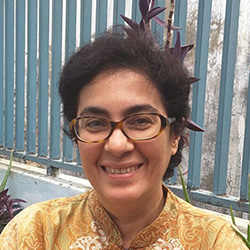For REDD+ payment, countries need framework, then investment
“When you talk about protection of forests, you have to remember that it not only benefits the country itself, it benefits everybody in the world. That’s important to remember when we talk about results-based payments.”
This payment mechanism – here raised by Martijn Wilder AM, head of Baker McKenzie’s Global Environmental Markets and Climate Change practice – is one of the crucial components REDD+, rewarding countries for successfully reducing greenhouse gas emissions.
However, this component along with others in the UN’s program on reducing emissions from deforestation and forest degredation (acronymned REDD) have been posing difficulties for implementing countries.
These challenges were discussed in “Forests in NDCs: Operationalizing REDD+ in the region”, a high-level panel on 23 April at the 2018 Asia-Pacific Rainforest Summit in Yogyakarta, Indonesia.
In the decade since its inception in Bali, REDD has expanded its mission to include more conservation, sustainability and carbon-stock efforts (bundled in the added ‘+’), and of late has been viewed as a pathway for developing countries to achieve NDCs – nationally determined contributions to the 2015 Paris Agreement.
Panelists said results-based payments has been one of the biggest obstacles along the way.
“Only a few REDD+ countries have successfully accessed results-based payments,” said the panel’s moderator Dr. Nur Masripatin, Senior Advisor on Climate Change and International Conventions to Siti Nurbaya, Indonesia’s Minister of Environment and Forestry.
“Currently, we are in the process of establishing a financial institution to manage the financing of REDD+,” said Emma Rachmawaty, Director of Mitigation at the same ministry.
“As this institutaion has not yet been established, we could not implement results-based payments.”
Gwen Sissiou, General Manager of REDD+ and Mitigation at Papua New Guinea’s Climate Change and Development Authority, raised the tangental challenge of measurement, reporting and verification (MRV) – a system for countries to document the progress for which they’ll be paid.
“Challenges are numerous and complex,” she said. “In REDD+, we need additional capacity in MRV.”

Gwen Sissiou, General Manager of REDD+ and Mitigation at Papua New Guinea’s Climate Change and Development Authority, speaks on the panel.
WORTHY OF INVESTMENT
Attracting private investment – which can provide enormous support to countries achieving their NDCs – is another reason why governments should work to get solid frameworks for REDD+ and other efforts in place.
Juan Chang, a Senior Specialist at the Green Climate Fund (GCF) – which has committed USD 3.7 billion to finance projects around the world that tackle climate change – stressed that in order to attract investment, countries need to have clear and consistent regulations that can uphold a program as large as REDD+.
He further advised that countries should have sound plans for how they will use invested money through various financial instruments (loans, equities, guarantees etc.), harmonize climate change efforts across all levels of government, and set MRV systems in place.
Panelists highlighted East Kalimantan as an Indonesian province that proves this is possible. Since 1970, the province depended primarily on non-renewable resources to fuel its development, which led to a declining rate of economic growth.
“By extracting natural resources, East Kalimantan became the sixth largest carbon-emitting province in Indonesia,” said Professor Daddy Ruhiyat from the Provincial Climate Change Council of East Kalimantan. “The majority of emissions stemmed from forest conversion and other land uses.”
To turn itself around, the province developed its Green Growth concept. In 2009, it began making preparations to implement REDD+, putting in place several programs to harmonize emissions reduction efforts between district and regional governments. It established a provincial council to coordinate climate change activities, promoted local forest management units and accelerated social forestry programs.
“East Kalimantan’s government has taken significant steps toward economic transformation – changing the economy’s original dependance on non-renewable natural resources to renewables, in the form of agriculture and the processing of primary products,” Ruhiyat said.
In October 2015, the Indonesian environmental ministry selected East Kalimantan as a pilot location for a performance-based emissions reduction program, sponsored by the World Bank’s Forest Carbon Partnership Facility. The province has since been working to further align its own REDD+ efforts with those in the national agenda and climate change policy.
POWER TO THE PEOPLE
Not all pieces of the REDD+ puzzle addressed were finance-oriented. Panelists said the success of REDD+ also depends largely on the involvement of local communities and their willingness and capacity to contribute to emissions-reduction activities.
Dahniar Andriani from HuMa Indonesia, a non-profit NGO that works to strengthen the rights of indigenous peoples, said that current laws and regulations do not sufficiently acknowledge the role indigenous communities play in mitigating climate change.
Remedying this in part means strengthening local tenurial rights over customary forests. In 2012, a constitutional court ruling removing customary forests from categorization as state forests was a major leap in recognizing the role of local communities in Indonesia. But without full tenure security, local communities lack incentive to invest their time and energy in REDD+ efforts.
“Indigenous people have a long journey – buy we’ve started this journey and seen positive signs, so we are optimistic,” said Dr. Masripatin, concluding the session.
We want you to share Forests News content, which is licensed under Creative Commons Attribution-NonCommercial-ShareAlike 4.0 International (CC BY-NC-SA 4.0). This means you are free to redistribute our material for non-commercial purposes. All we ask is that you give Forests News appropriate credit and link to the original Forests News content, indicate if changes were made, and distribute your contributions under the same Creative Commons license. You must notify Forests News if you repost, reprint or reuse our materials by contacting forestsnews@cifor-icraf.org.














